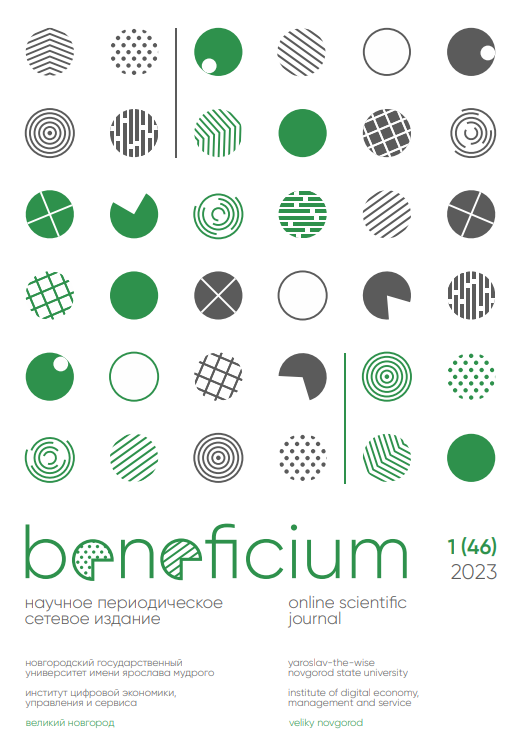PROBLEMS OF REGULATING THE FUNCTIONING OF RECLAMATION SYSTEMS WITH DRAINAGE RUNOFF BY THE ENVIRONMENTAL LEGISLATION OF THE RUSSIAN FEDERATION
Abstract
The purpose of the article is to identify the problems of regulating the functioning of reclamation systems with drainage runoff by the environmental legislation of the Russian Federation and develop ways to solve them. In order to achieve this purpose, qualitative indicators of collector-drainage water from drainage and irrigation systems of Russia have been studied. In the course of the research, the Russian regulatory framework in the field of environmental protection and rational use of natural resources has been analyzed, including objects of negative impact on the environment, as well as requirements to operation and production control of reclamation systems have been analyzed. The Water Code of the Russian Federation does not differentiate drainage water by type and generally refers to “wastewater”. In the current land reclamation standards, drains are devices “for collecting and diverting filtered and groundwater”. At the same time, federal state budgetary institutions for land reclamation and agricultural water supply, which operate drainage systems, are not included in the register of recipients of water use permits – specifically for wastewater discharge, but such permits are issued to meliorative farms that supply water for irrigation, in case the reclamation system is equipped with a collector-drainage network. In the current realities, there are legal uncertainties and contradictions, which need to be solved. In accordance with the stated above, in order to eliminate legal uncertainties and to improve the working conditions of federal state budgetary institutions “Meliorvodkhoz”, it is necessary: to differentiate the definition of “drainage water” with their division by objects of formation, including distinguishing “drainage water from reclamation systems”; to distinguish specifics of “drainage water from drainage systems” and “drainage water from reclamation systems” within the definition “drainage water from irrigation systems”; to specify conditions of categorizing meliorative systems as objects of negative impact on the environment.
Keywords: Water Code of the Russian Federation, collector-drainage waters, reclamation systems, objects of negative impact on the environment, water discharge, land reclamation management, environmental legislation
References
Jouni H.J., Liaghat A., Hassanoghli A., Ritzema H. Managing controlled drainage in irrigated farmers’ fields: A case study in the Moghan plain, Iran // Agricultural Water Management. 2018. Vol. 208. Pp. 393-405. DOI: 10.1016/j.agwat.2018.06.037
Kireicheva L.V., Glazunova I.V. Environmentally friendly resources. Technical solutions for wastewater treatment // Watermagazine. 2008. Vol. 4. Pp. 44-47. (In Russ.).
Drovovozova T. I., Mariach S. A., Panenko N. N. Technical solutions for cleaning drainage water from irrigated areas // IOP Conference Series: Earth and Environmental Science. 2021. Vol. 677. P. 42094. DOI: 10.1088/1755-1315/677/4/042094
Zubarev V.A., Mazhaysky Yu.A., Guseva T.M. The impact of drainage reclamation on the components of agricultural landscapes of small rivers // Agronomy Research. 2020. Vol. 18(4). Рр. 2677-2686. DOI: 15159/AR.20.218
Vershinskaya M.E. Ekologo-vodohozyajstvennaya ocenka vodnyh sistem [Ecological and water management assessment of water systems]: monograph / M.E. Vershinskaya, V.V. Shabanov, V.N. Markin. Moscow: Publishing House of the RSAU-MAСA, 2016. 148. p. (In Russ.).
Vodnye resursy [Water resources] (2023). Rosvodresursy [Ruswaterresources]. (In Russ.). URL: https://gis.favr.ru/opendata (accessed on 01.02.2023).
Informatsiya o predostavlenii vodnyh ob"ektov v pol'zovanie po sostoyaniyu na 26.01.2023 [Information on the provision of water bodies for use as of 26.01.2023] (2023). Rosvodresursy [Ruswaterresources]. (In Russ.). URL: https://voda.gov.ru/activities/informatsiya-o-predostavlenii-vodnykh-obektov-v-polzovanie/558860/ (accessed on 01.02.2023).
Gosudarstvennyj reestr ob"ektov, okazyvayushchih negativnoe vozdejstvie na okruzhayushchuyu sredu [State Register of Objects that have a negative impact on the Environment] (2023). Rostprirodnadzor [Rostprirodnadzor]. (In Russ.). URL: https://uonvos.rpn.gov.ru/rpn/pto-uonvos/onv_registry?pcurrent_page=1&pper_page=20&plast_page=1&oinclusion_date=desc (accessed on 01.02.2023).
About the Authors
Svetlana A. Manzhina – Cand. Sci. (Engineering), Docent; Senior Research Associate, Russian Scientific Research Institute of Land Improvement Problems, Novocherkassk, Russia. E-mail: manz.svetlana@yandex.ru. SPIN РИНЦ 3829-3611. ORCID 0000-0001-9322-0843. ResearcherID E-8392-2016
Tatiana I. Drovovozova – Doctor of Engineering Sciences, Docent; Senior Research Associate, Russian Scientific Research Institute of Land Improvement Problems, Novocherkassk, Russia. E-mail: Tid70.drovovozova@yandex.ru. SPIN РИНЦ 7011-0905. ORCID 0000-0002-8724-7799. ResearcherID ABH-4873-2020
For citation: Manzhina S.A., Drovovozova T.I. Problems of Regulating the Functioning of Reclamation Systems with Drainage Runoff by the Environmental Legislation of the Russian Federation // BENEFICIUM. 2023. Vol. 1(46). Pp. 36-41. (In Russ.). DOI: 10.34680/BENEFICIUM.2023.1(46).36-41









